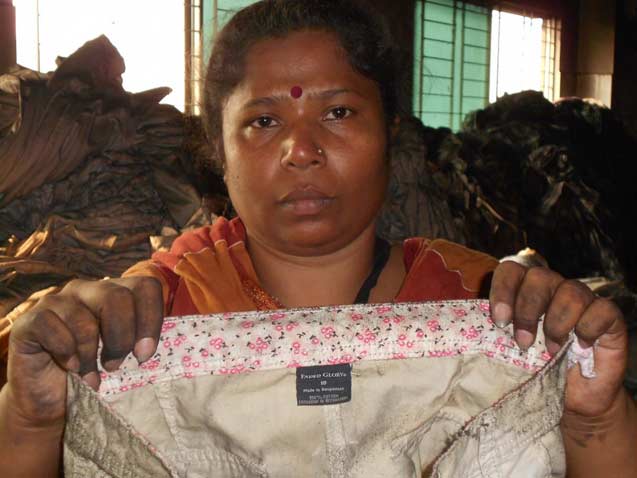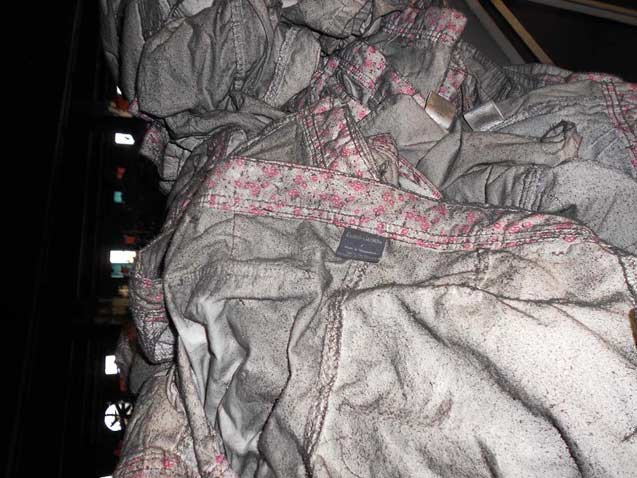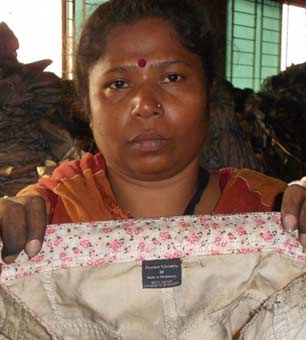An update, including Walmart’s new statement blaming the apparel’s presence on a rogue supplier, and reactions from advocates, appears below.
NGOs slammed Walmart over a fire that killed at least 112 workers at a Bangladesh factory that supplied apparel for the retail giant. While Walmart says it has not confirmed that it has any relationship to the factory, photos provided to The Nation show piles of clothes made for one of its exclusive brands.
In a statement e-mailed Sunday night, Walmart expressed sympathy for the victims’ families, and said that it was “trying to determine if the factory has a current relationship with Walmart or one of our suppliers…” The company called fire safety “a critically important area of Walmart’s factory audit program,” and said that it has been “working across the apparel industry to improve fire safety education and training in Bangladesh.” Walmart added that it has “partnered with several independent organizations to develop and roll out fire safety training tools for factory management and workers.”
But in a Monday interview, Workers Rights Consortium Executive Director Scott Nova said Walmart’s “culpability is enormous. First of all they are the largest buyer from Bangladesh” and so “they make the market.” Nova said Bangladesh has become the world’s second largest apparel supplier “because they’ve given Walmart and its competitors what they want, which is the cheapest possible labor costs.”
“So Walmart is supporting, is incentivizing, an industry strategy in Bangladesh: extreme low wages, non-existent regulation, brutal suppression of any attempt by workers to act collectively to improve wages and conditions,” Nova told The Nation. “This factory is a product of that strategy that Walmart invites, supports, and perpetuates.” The WRC is a labor monitoring group whose board is composed of students, labor organizations, and university administrators.
The fire started Saturday night in a ground floor warehouse. According to media reports, the factory’s emergency exits were insufficient in number and unsafe in design, routing through the inside, rather than the outside, of the building. Some workers survived on the factory’s roof; several jumped out of the building. A lack of safe fire exits contributed to the death toll in New York’s notorious 1911 Triangle Shirtwaist Factory Fire.
A document on the website of the factory’s owner, Tuba Group, showed that the factory had received an “orange” rating from Walmart in May 2011, due to “violations and/or conditions that were deemed to be high risk.” The same document said that three such ratings within two years would result in a year-long suspension by Walmart.
“Obviously, they didn’t do anything about it,” said Nova. He called Walmart’s internal monitoring system “a joke” that was “set up to enable Walmart to claim that it’s policing, without in any way, shape or form inconveniencing its production process.”
A Walmart spokesperson told the New York Times that the retail giant had been “unable to confirm” the veracity of Tuba Group document, or whether Tazreen Fashions, the Tuba Group subsidiary running the factory, was supplying any Walmart goods.
Also See: Massive Fire Kills at Least 118 Factory Workers in Bangladesh at Walmart Supplier
But photos taken after the fire taken the Bangladesh Center for Worker Solidarity, provided to The Nation by the International Labor Rights Forum, show clothing with Walmart’s exclusive Faded Glory label (photos below). Nova accused Walmart of intentionally dragging its feet on admitting its connection to the factory, in hopes that by the time the connection is confirmed, the media will have lost interest.
WRC’s Nova said that Bangladesh’s deadly labor conditions are a direct consequence of Walmart’s business model. If a factory “really followed the law,” said Nova, “if they allowed workers to organize and bargained a contract, if they invested in necessary health and safety equipment, if they restructured the building to make it safe, put in place sprinklers and outside fire escapes, their costs would rise, they would have to charge more for their product, and they would immediately lose Walmart and their other customers.”
According to ILRF, Saturday’s fire had the highest death toll of any Bangladesh factory accident to date. Had it happened earlier in the day, it could have been much higher. Another Bangladesh factory fire Monday morning resulted in at least eight injuries; that factory is also a Walmart supplier, according to the WRC.
Nova said that worse death tolls are ahead if the status quo persists. “You do not need to be a fire safety expert to realize that a factory like this is dangerous…” said Nova. “And yet there is no evidence that Walmart has taken any meaningful action to improve their safety practices in the supply chain in Bangladesh.”
The fire comes eight months after the body of Bangladeshi labor activist Aminul Islam was found dead and apparently tortured. Islam was working to organize the Bangladeshi garment factory’s workers and to expose their conditions in international media. “It’s virtually certain that somebody acting at the behest of the government or industry killed him,” said Nova. In an interview following his death, Islam’s co-worker Kalpona Akter told The Nation that “workers do not have their voice in the workplace,” that major companies’ monitoring “is so poor,” and that the brands “should really take some responsibility.”
The WRC’s criticisms were echoed by other non-profits, including the Amsterdam-based Clean Clothes Campaign, which charged in a Sunday statement that major brands’ “failure to take action amounts to criminal negligence.”
Walmart has come under repeated scrutiny for the labor conditions at its suppliers. In June, guest workers at C.J.’s Seafood went on strike over alleged forced labor conditions; after initially saying it had investigated and couldn’t substantiate the accusations, Walmart eventually suspended the supplier. In September, Human Rights Watch releases a report finding widespread debt bondage at the Phatthana shrimp company in Thailand, and accusing Walmart of offering shifting and contradictory explanations of its relationship to the company.
“The only way factories in Bangladesh can survive, given the prices that the western brands are willing to pay, is to operate unsafely,” said Nova. “And that’s why you get fires. And for all of their rhetoric about corporate social responsibility and all of these monitoring programs and audits, brands and retailers will not pay one penny more for factories.”
Update (7 PM Monday, November 26): In a new statement released Monday evening, Walmart said that at the time of the fire, the factory “was no longer authorized to produce merchandise for Walmart” and said that a supplier had “subcontracted work to this factory without authorization and in direct violation of our policies.”
Walmart said that it had terminated the rogue supplier today, and added, “The fact that this occurred is extremely troubling to us, and we will continue to work across the apparel industry to improve fire safety education and training in Bangladesh.” In response to an inquiry from The Nation regarding the identity of the supplier, when the factory ceased to be authorized, and whether Walmart continued to pay for work performed there after the authorization ended, a Walmart official said the company is not commenting beyond the new statement.
Interviewed following that statement, Liana Foxvog, the Director of Organizing for the International Labor Rights Forum, said she did not have the information “to evaluate whether or not Walmart is telling the truth,” but that if the company’s claim is accurate, it reflects poorly on its oversight of supplier compliance with local safety and labor laws, and with its own Code of Conduct.
Foxvog added that the remedy to dire safety issues should not have been “to keep the results of its inspections hidden and to walk away from workers who are working in a death trap factory.” Instead, said Foxvog, Walmart should “pay sufficient prices” and “require the factories to come into compliance.” She said Bangladesh factories “often feel like they have to cut corners in order to make products at the low prices” expected by top brands.
Asked Monday evening about Walmart’s latest statement, Nova e-mailed, “Walmart is a company whose foundational corporate principle is precise control of supply chain logistics and information. Now, after equivocating for 48 hours, they tell the world that they are shocked to discover that their goods were being made at the Tazreen factory.” Nova noted Walmart’s refusal to identify “the supplier responsible for this supposed unauthorized subcontracting, or any other details about how Walmart goods miraculously found their way to Tazreen.” “Whatever Walmart now claims,” added Nova, “what we know for sure is that Walmart goods were being produced at this factory and that Walmart is responsible for protecting the rights and safety of workers who make Walmart clothes.”
 (Photo: International Labor Rights Forum)
(Photo: International Labor Rights Forum)
 (Photo: International Labor Rights Forum)
(Photo: International Labor Rights Forum)
While Walmart is denying claims of human rights abuses overseas, US employees are striking against poverty wages and intimidation tactics here at home. Check out Josh Eidelson’s coverage of the historic Walmart worker strikes here.
Speaking against the authoritarian crackdown
In the midst of a nationwide attack on civil liberties, Truthout urgently needs your help.
Journalism is a critical tool in the fight against Trump and his extremist agenda. The right wing knows this — that’s why they’ve taken over many legacy media publications.
But we won’t let truth be replaced by propaganda. As the Trump administration works to silence dissent, please support nonprofit independent journalism. Truthout is almost entirely funded by individual giving, so a one-time or monthly donation goes a long way. Click below to sustain our work.
